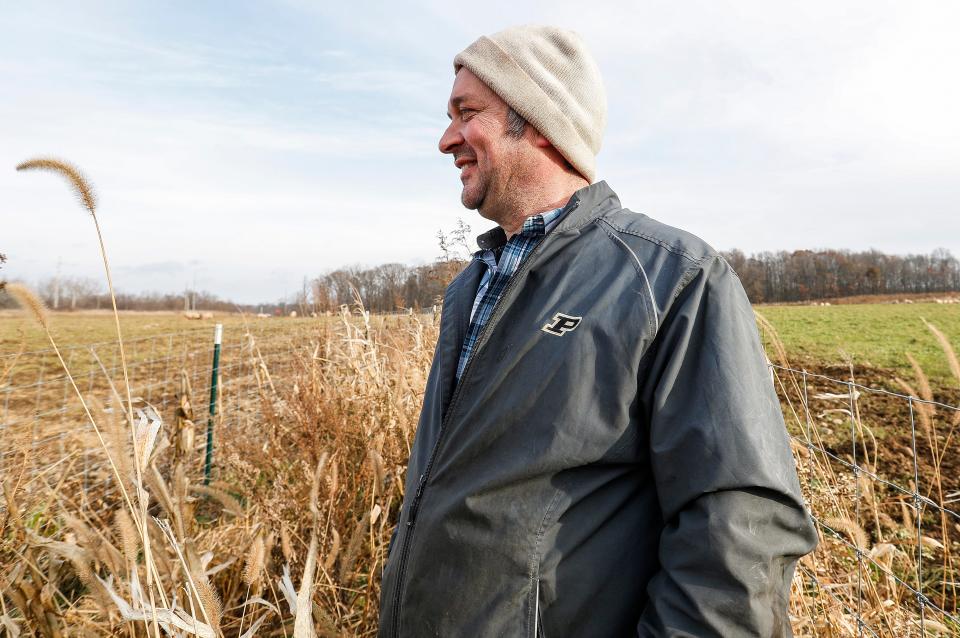Op/Ed: Independent pork farmers case against 'Big Ag' is classic David vs. Goliath battle
It seems like everywhere you turn these days you hear someone talking about the economy, inflation and gas prices. However, last week the U.S. Supreme Court heard a pivotal case that’s flying under the radar and that will have far-reaching effects on the economy.
The Supreme Court is going to decide in National Pork Producers Council, et al v. Karen Ross if independent, family hog farmers, like me, get to play on a level playing field against “Big Ag.” Voters in California got it right when 63% of them passed Proposition 12 in 2018.
These reforms ensure that sows don’t inhabit coffin-like gestation crates, which don’t allow pregnant mother pigs to stand, lie down, turn around and even extend their limbs. The ballot measure also ensures that pork sold in the state comes from operations meeting these standards. Because of consumer-driven demand for more humanely raised pork, many independent farmers had been complying with these reforms for years.
More:Supreme Court majority questions California law regulating pig pens, pork products
Independent family farmers across the country support the rights of voters to set standards about how their food is produced. We don’t run from consumer-driven demand, we simply roll up our sleeves and innovate to meet the demand of our customers. However, “Big Ag” is used to writing their own laws and playing by their own rules. Consumer demand for more humanely raised food is less important to them than market consolidation and increasing profit.
The truth is, we’ve been fighting battles against multinational agribusiness for decades. The meat industry in particular is controlled by only a handful of corporations, including Smithfield Foods Inc., Tyson Foods Inc., JBS USA Holdings Inc., and Cargill Inc., some of them foreign owned. In fact, those four companies control an alarming 66% of the hog-processing market.

Thirty firms, or farms as they like to call them, own about two-thirds of the hogs in the U.S. Independent family farms only own about 14% of the hogs in the U.S. That leaves farmers like me left to take whatever scraps we can muster. These companies are raking in record profits while farmers and rural communities continue to deal with the economic and environmental devastation these corporations and their web of factory farms creates.
The National Pork Producers Council and the American Farm Bureau Federation, on behalf of their agribusiness cronies, will tell you that Proposition 12 interferes with interstate commerce. I’m here to tell you that those two trade groups stopped representing family farmers a long time ago.
A unanimous, three-judge panel of the U.S. Court of Appeals rejected their slanted argument that the law’s out-of-state effects made Proposition 12’s reforms invalid. You can’t trust a message that comes from organizations whose primary function is to argue what’s in the best interest of the foreign-owned corporations that have crippled our food system in order to make as much profit as possible.
'Most expensive crop in decades': Farmers face higher stakes than ever with inflation
We raise pigs outdoors on our LaGrange, Indiana, farm, along with turkey and lamb. We pride ourselves on treating the animals well and process them here on our farm at our USDA-inspected meat processing plant. From there, we sell to chefs and retailers as well as directly to consumers across the country.
Over the past two decades, we’ve learned that consumers really want the pork we produce, but every step in the supply chain between us and them is controlled by those multinational meatpackers trying to squash Proposition 12. From where we sit, Proposition 12 isn’t just good for the animals and consumers, but it will also be good for farmers like me who need a fair market to compete in.
More:How consumers could drive more farmers to fight climate change
I know there is a lot of reporting out there about the economy, but this is an important issue that has far-reaching effects on our food system and on the livelihood of hog farmers across the country. The downstream effects of the Supreme Court ruling in favor of corporate meatpacking giants would be disastrous for independent, family farmers.
Gunthorp Farms, along with folks like my friend Will Harris at White Oak Pastures in Bluffton, Georgia, are investing in our rural communities. However, without more market opportunities the places we call home will continue to dry up. In fact, a recent report found a 44% decline in population for counties producing pigs for the multinational meatpackers.
More:Small farms are dying. This plow-free plan could help save them.
The livelihood of independent, family farmers is on the line with the Supreme Court’s decision. Farmers like me want to go to work every day to produce quality food you put on table while knowing that we have a level playing field against big corporations. We’re not asking for anything except a fair shot at success. This court case represents an opportunity for us to compete fair and square with the big guys.
Greg Gunthorp, an independent, family farmer, owns Gunthorp Farms in LaGrange.
This article originally appeared on Indianapolis Star: Indiana hog farmers fight unfair advantages of 'Big Ag' in SCOTUS case

